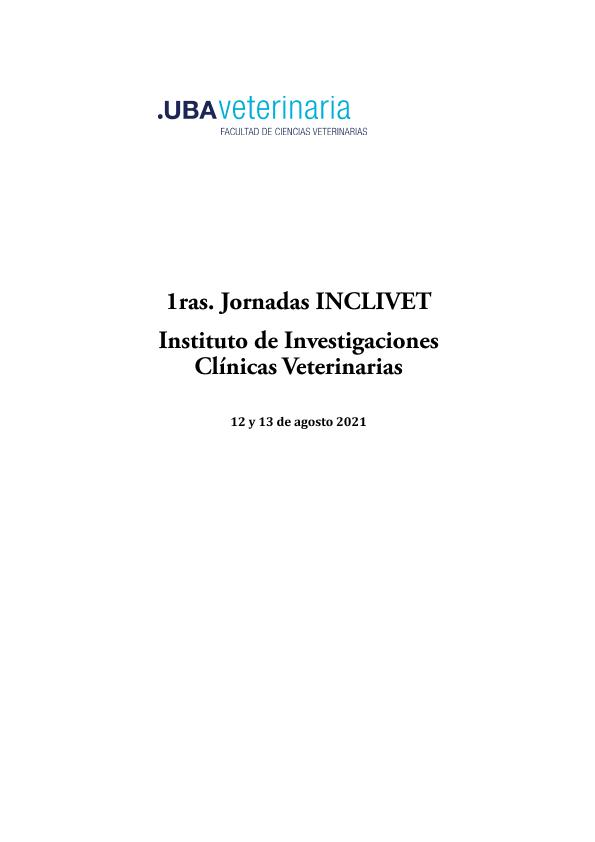Mostrar el registro sencillo del ítem
dc.contributor.author
Martínez, Sofía

dc.contributor.author
Cacciato, Claudio Santiago

dc.contributor.author
Fogel, Fernando Adrián

dc.contributor.author
Maté, María Laura

dc.contributor.author
Sanchez Bruni, Sergio Fabian

dc.contributor.author
del Sole, Maria Jose

dc.date.available
2022-05-27T15:30:38Z
dc.date.issued
2021
dc.identifier.citation
Clinical, cytologic and microbiological evidence of pyoderma recovery in dogs with demodicosis without antimicrobial therapy; 1ras. Jornadas del Instituto de Investigaciones Clínicas Veterinarias; Argentina; 2021; 52-52
dc.identifier.issn
1514-6634
dc.identifier.uri
http://hdl.handle.net/11336/158376
dc.description.abstract
Generalized pustular canine demodicosis is the result of an overpopulation of mites of Demodex spp. commonly associated with infection by Staphylococcus spp., normal inhabitants of the skin of most mammals. Both microorganisms proliferate within the hair follicles causing follicular hyperkeratosis in the head, trunk and legs. Dermatological examination reveals signs such as erythema, alopecia, folliculitis and furunculosis. The diagnosis is confirmed by skin scraping and cytology of the lesions, microscopically identifying mites and inflammatory cells with cocci, respectively. In the past, systemic antibiotic therapy was supported for all dogs with secondary bacterial infection. Nowadays, as the incidence of skin infections with multi-resistant bacteria is increasing, a judicious use of systemic antibiotics is recommended. Thus, the Clinical Practice Guidelines on Demodicosis Treatment (2020) recommend topical antibiotic therapy in dogs with generalized demodicosis up to 1-2 weeks after clinical and cytologic resolution of the skin infection. The main goal of this study was to assess the clinical-cytological evolution and bacteriological cure of canines with generalized demodicosis treated only with acaricides. For this purpose, 7 (seven) patients with pustular demodicosis were admitted for their attention at the Teaching Hospital of Small Animals (HEPA). On day 0, the animals were clinically evaluated and clinical score awarded; cytological test and skin swabs were obtained from lesions. Then, patients initiated a non-antibiotic treatment as follow: 4 (four) dogs were treated with afoxolaner at a dose of 2.7-6.9 mg/kg on day 0 and day 28, and 3 (three) dogs were treated with oral ivermectin at a dose of 0.5 mg/kg/24 h for 63 days. On days 14, 35 and 56 post-treatment, clinical score and cytological results were recorded and sample swabs from skin lesions were obtained. Cytology samples were stained with Giemsa Merck® by conventional technique and observed microscopically by the same dermatologist. Sample swabs were stored in Stuart medium up to overnight growth on Tryptic Soy Agar medium supplemented with 10% sterile bovine blood and the phenotypic identification bacterial strains were performed by conventional biochemical techniques. Clinical score (mean +/- DE) decreased considerably throughout the treatment as follows: 31.8 +/- 3.4, 28.0 +/- 5.4, 13.2 +/- 5.0, and 4.8 +/- 1.5 on day 0, 14, 35 and 56, respectively. Cytology with pyoderma characteristics were positive at days 0 and 14 post-treatment in all dogs, and became negative in 5 dogs at day 35, being negative in all dogs (6) at day 56 . Staphylococcus spp. were isolated from skin samples in all dogs on days 0 and became negative in 6 dogs at day 56 post-treatment. In conclusion, these preliminary results propose that pyoderma associated with canine demodicosis could resolve clinical, cytological and bacteriologically with single acaricidal therapy, avoiding systemic or topical antibiotic therapy.
dc.format
application/pdf
dc.language.iso
eng
dc.publisher
Universidad de Buenos Aires. Facultad de Ciencias Veterinarias
dc.rights
info:eu-repo/semantics/openAccess
dc.rights.uri
https://creativecommons.org/licenses/by-nc-nd/2.5/ar/
dc.subject
DEMODICOSIS
dc.subject
PYODERMA
dc.subject
ANTIBIOTIC
dc.subject.classification
Otras Ciencias Veterinarias

dc.subject.classification
Ciencias Veterinarias

dc.subject.classification
CIENCIAS AGRÍCOLAS

dc.title
Clinical, cytologic and microbiological evidence of pyoderma recovery in dogs with demodicosis without antimicrobial therapy
dc.type
info:eu-repo/semantics/publishedVersion
dc.type
info:eu-repo/semantics/conferenceObject
dc.type
info:ar-repo/semantics/documento de conferencia
dc.date.updated
2022-04-28T11:58:14Z
dc.identifier.eissn
1668-3498
dc.journal.volume
23
dc.journal.number
2
dc.journal.pagination
52-52
dc.journal.pais
Argentina

dc.journal.ciudad
Buenos Aires
dc.description.fil
Fil: Martínez, Sofía. Consejo Nacional de Investigaciones Científicas y Técnicas. Centro Científico Tecnológico Conicet - Tandil. Centro de Investigación Veterinaria de Tandil. Universidad Nacional del Centro de la Provincia de Buenos Aires. Centro de Investigación Veterinaria de Tandil. Provincia de Buenos Aires. Gobernación. Comision de Investigaciones Científicas. Centro de Investigación Veterinaria de Tandil; Argentina
dc.description.fil
Fil: Cacciato, Claudio Santiago. Consejo Nacional de Investigaciones Científicas y Técnicas. Centro Científico Tecnológico Conicet - Tandil. Centro de Investigación Veterinaria de Tandil. Universidad Nacional del Centro de la Provincia de Buenos Aires. Centro de Investigación Veterinaria de Tandil. Provincia de Buenos Aires. Gobernación. Comision de Investigaciones Científicas. Centro de Investigación Veterinaria de Tandil; Argentina. Provincia de Buenos Aires. Gobernación. Comisión de Investigaciones Científicas; Argentina
dc.description.fil
Fil: Fogel, Fernando Adrián. Universidad Nacional del Centro de la Provincia de Buenos Aires. Facultad de Ciencias Veterinarias. Departamento de Clinicas. Hospital Escuela; Argentina
dc.description.fil
Fil: Maté, María Laura. Consejo Nacional de Investigaciones Científicas y Técnicas. Centro Científico Tecnológico Conicet - Tandil. Centro de Investigación Veterinaria de Tandil. Universidad Nacional del Centro de la Provincia de Buenos Aires. Centro de Investigación Veterinaria de Tandil. Provincia de Buenos Aires. Gobernación. Comision de Investigaciones Científicas. Centro de Investigación Veterinaria de Tandil; Argentina
dc.description.fil
Fil: Sanchez Bruni, Sergio Fabian. Consejo Nacional de Investigaciones Científicas y Técnicas. Centro Científico Tecnológico Conicet - Tandil. Centro de Investigación Veterinaria de Tandil. Universidad Nacional del Centro de la Provincia de Buenos Aires. Centro de Investigación Veterinaria de Tandil. Provincia de Buenos Aires. Gobernación. Comision de Investigaciones Científicas. Centro de Investigación Veterinaria de Tandil; Argentina
dc.description.fil
Fil: del Sole, Maria Jose. Consejo Nacional de Investigaciones Científicas y Técnicas. Centro Científico Tecnológico Conicet - Tandil. Centro de Investigación Veterinaria de Tandil. Universidad Nacional del Centro de la Provincia de Buenos Aires. Centro de Investigación Veterinaria de Tandil. Provincia de Buenos Aires. Gobernación. Comision de Investigaciones Científicas. Centro de Investigación Veterinaria de Tandil; Argentina
dc.relation.alternativeid
info:eu-repo/semantics/altIdentifier/url/http://www.fvet.uba.ar/inclivet/
dc.relation.alternativeid
info:eu-repo/semantics/altIdentifier/url/http://www.fvet.uba.ar/archivos/publicaciones/invet/vol23-2-2021/jornadas_incli_2021.pdf
dc.conicet.rol
Autor

dc.conicet.rol
Autor

dc.conicet.rol
Autor

dc.conicet.rol
Autor

dc.conicet.rol
Autor

dc.conicet.rol
Autor

dc.coverage
Nacional
dc.type.subtype
Jornada
dc.description.nombreEvento
1ras. Jornadas del Instituto de Investigaciones Clínicas Veterinarias
dc.date.evento
2021-08-12
dc.description.paisEvento
Argentina

dc.type.publicacion
Journal
dc.description.institucionOrganizadora
Universidad de Buenos Aires. Facultad de Ciencias Veterinarias. Instituto de Investigaciones Clínicas Veterinarias
dc.source.revista
Invet
dc.date.eventoHasta
2021-08-13
dc.type
Jornada
Archivos asociados
